-
PROJECTS
Working groups and faculty-led projects
That the subject, or the I, is not an object in the world is one of the most fundamental insights in philosophy. It is also one of the most difficult. It is an insight that is often associated with Kant, and with later German Idealism, but it is also prevalent in the French tradition and in early analytic philosophy. In this conference, participants will discuss the questions: How can we develop accounts of selfconsciousness and mutual recognition that do justice to this insight? What is it to be conscious of ourselves as subjects of thinking and of acting? And how do we recognize others as subjects? The questions will be approached through discussion of the history of philosophy and through its development in more recent approaches from contemporary philosophy. The conference is interdisciplinary in its reach, because it is only by answering these fundamental questions about selfconsciousness and mutual recognition that we can begin to understand the different ways in which we learn about ourselves and about others in the more specialized humanistic disciplines.
Faculty Coordinators
Alexandra Newton (Philosophy)
Andrews Reath (Philosophy)
Faculty Coordinators
Linda Hall (Anthropology)
Yolanda Moses (Anthropology)
The Horror of Color Working Group is a space for students and faculty to collaboratively engage research in horror studies with a specific focus on scholarship on horror and race and horror cultural productions by U.S.-based creators of color. The group brings together students and faculty across the humanities and social sciences to address topics ranging from the development and solidifying of genres such as Afro Horror, Indigenous Horror, and U.S. Latinx horror to fandoms of color with the goal of fostering intellectual exchange on the topic of EthnoHorror by 1) holding discussions of works in progress, 2) organizing conversations around shared readings, and 3) invited talks/panels.
Faculty Coordinators
Magda Garcia (English)
The project will explore the concept of style, together with related concepts, by comparing the roles they have played across a wide range of disciplines, from the arts and humanities all the way to the sciences and mathematics. The concept of style has a long history, especially in the visual arts, literature, and music. Under the name of “reasoning style” it has also played a significant role in the history and philosophy of science, as well as in the history and philosophy of mathematics. In those areas too, interest in the concept has increased noticeably over the last few years, both nationally and internationally. What is shared across all these disciplines, despite obvious differences in subject matters, basic methods, and goals, is the sense of an existing plurality of styles, which differ from each other in terms of varying ways of seeing and shaping their respective objects. Understood as such, the concept of style is closely related to a number of other concepts, including: episteme, discourse, structure, paradigm, methodology, way of making sense, form of explanation, and kind of knowledge.
Learn more: Concept of Style Website
Faculty Coordinators
Erich Reck, Philosophy
Johannes Endres, Art History and Comparative Literature
Funded by the UC Humanities Consortium, Summer “Pop-Up” awards support short-term collaborations between faculty from UCR and other UC campuses on a humanities-related topic of common interest over the course the summer.
2024 Project:
Between Refuge and Refuse: New Mediums/Methods for Theorizing Refuge(e) Environment
This virtual workshop takes filmmaker Trinh T. Minh-ha’s theorization of the intervals and passages between refuge, refuse (noun), and refuse (verb) as a point of departure.
Participants:
Evyn Lê Espiritu Gandhi (Asian American Studies, UCLA)
Emily Hue (Ethnic Studies, UCR)
Heidi-Amin Hong (English, UC Santa Barbara)
2021 Projects:
Bodies and Infrastructures in Contemporary Japanese Fiction
Anne McNight, UCR, Comparative Literature & Languages (Convener)
Margherita Long, UCI, East Asian Studies
Daniel Cuong O’Neill, East Asian Languages and Cultures
Jon L. Pitt, UCI, Japanese Environmental Studies
Summer Pop-up + Humanistic Bioarchaeology
Sara K. Becker, UCR, Anthropology (Convener)
Elizabeth S. Berger, UCR, Anthropology
Beth Koontz Scaffidi, UC Merced, Anthropology and Heritage Studies
Christina Torres-Rouff, UC Merced, Anthropology and Heritage Studies
-
CONFERENCES
Conferences sponsored by the Center for Ideas and Society
The 2020s thus far have been defined by numerous and often interrelated crises, which have prompted widespread conversation on the urgent need to imagine and implement better, different, and innovative solutions for the future. Influenced by feminist, queer, decolonial, and critical race theories, speculative fiction writing and scholarship have likewise become increasingly invested in care, resistance, and liberation as strategies toward futurity. In accordance with these concerns, this project will relaunch the Eaton Conference of Science Fiction around the theme “Reimagining the Archive” in order to investigate reparative approaches to speculative fiction and its history, specifically with the archive. From the prominence of the Eaton Collection of Science Fiction and Fantasy to its Speculative Fictions and Cultures of Science program, the study of speculative fiction has deep significance to the University of California, Riverside. In seeking to revive the Eaton Conference, the organizers aim to bolster UCR’s prestigious reputation in the field and foster a network of new and emerging scholars and artists. Supporting emergent talent is an ongoing act of care that this version of the conference will prioritize as it addresses ongoing disparities in the field (and across academia) and (re)imagines the future of humanities research.
Faculty Coordinators
andré carrington (English), Loren Barbour (English), Chelsea-Mae Yuipco (Media & Cultural Studies), K Persinger (Media & Cultural Studies), and Liza Wemakor (English)
Hosted on February 21, 2025, the conference will gather University of California graduate students in the humanities or humanistic social sciences or arts for virtual panel presentations. The 2025 theme will be announced soon.
For questions or more information: Katharine.Henshaw@ucr.edu
-
PROGRAMS
Programs
–
Community Conversations
 The popular Disciplines in Dialogue program pairs UCR faculty from different academic disciplines for a conversation on topics of interest to a public audience, primarily comprising Osher members and attendees at UCR Palm Desert Center events. The series reaches approximately 500 community members each year. The 2020-21 series will be hosted via Zoom webinar on Thursdays at 6 pm.
The popular Disciplines in Dialogue program pairs UCR faculty from different academic disciplines for a conversation on topics of interest to a public audience, primarily comprising Osher members and attendees at UCR Palm Desert Center events. The series reaches approximately 500 community members each year. The 2020-21 series will be hosted via Zoom webinar on Thursdays at 6 pm.
2021 Series: Pivotal Moment(s): “You should have been there!”
What recent or historical event or series of connected events would you claim has been crucially important and in what way? What moment or series of moments was world changing in ways well-known or overlooked? If you had a time machine and could travel anywhere in time, what moments would you not want to miss?
January 7: Pivotal Moments in Science Fiction:
- Jonathan Alexander (English and Informatics and Associate Dean, Division of Undergraduate Education UC, Irvine)
- Sherryl Vint (English and Media and Cultural Studies UCR)
February 4: Pivotal Moments in African Politics:
- Ademide Adelusi-Adeluyi (History, UCR)
- Kim Dionne (Political Science, UCR)
March 4: Pivotal Moments in Latin American Art:
- Savannah Esquivel (Art History, UCR)
- Aleca Le Blanc (Art History, UCR)
March 23: Pivotal Moments in Environmental History:
- Philipp Lehmann (History, UCR)
- Jade Sasser (Gender and Sexuality Studies, UCR)
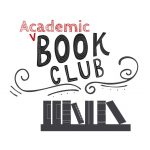 Academic Book Club awards cover the purchase of books for virtual groups of faculty and/or graduate students who agree to meet up online to discuss sections of the book at least 5 times over the coming quarter. Though we ask that at least half the participants be CHASS faculty and/or graduate students, conveners and other club members may be from any school or college at UCR.
Academic Book Club awards cover the purchase of books for virtual groups of faculty and/or graduate students who agree to meet up online to discuss sections of the book at least 5 times over the coming quarter. Though we ask that at least half the participants be CHASS faculty and/or graduate students, conveners and other club members may be from any school or college at UCR.
Club leaders convene meetings via Zoom or other online meeting room services. Selected titles should have the potential to engage multiple perspectives, disciplines and methods in critical inquiry. Inclusive, cross-disciplinary groups are encouraged. At the end of the quarter, groups will be asked to provide feedback on their experiences.
Apply Now!
2021 Summer Book Clubs:
White Kids: Growing Up with Privilege in a Racially Divided America (Flip Tanedo, Kalina Michalska, Annika Speer, facilitators)
We Do This ‘Til We Free Us: Abolitionist Organizing and Transforming Justice (Keith Miayke, facilitator)
We Do This ‘Til We Free Us: Abolitionist Organizing and Transforming Justice (Dana Simmons, facilitator)
Python for Linguists (Covadonga Lamar Prieto, facilitator)
Song of Achilles (Annie Ditta, facilitator)
Under Representation (Nancy Carranza, facilitator
2020-21 Book Clubs:
Spring Quarter Titles
New Age of Empire: How Racism and Colonialism Still Rule the World (Kim Dionne, facilitator)
New Black Sociologists: Historical and Contemporary Perspectives (Victoria Reyes, facilitator)
Coddling of the American Mind (Annie Ditta, facilitator)
Winter Quarter Titles
Strange Order of Things: Life, Feeling and the Making of Cultures (Liz Davis, facilitator)
Subtle Art of Not Giving a F*** / My Own Words (Annie Ditta, facilitator)
Culturally Responsive Teaching (Annie Ditta, facilitator)
Localism and the Ancient Greek City (John Haberstroh, facilitator)
Ministry of Utmost Happiness (Ruhi Kahn, facilitator)
The Lonely Letters (Melissa Wilcox, facilitator)
Engaging Contradictions: Theory, Politics and Methods of Activist Scholarship (Grecia Perez and Thelma Patnett, facilitators)
The Problem with Everything (Flip Tanedo, facilitator)
Conflict is Not Abuse (Dana Simmons and Setsu Shigematsu, facilitators)
Fall Quarter Titles
Marking Time: Art in the Age of Incarceration / What’s the Use / Ezili’s Mirrors (Crystal Baik, facilitator)
The Alchemist / The Great Influenza (Annie Ditta, facilitator)
Pedagogy of the Oppressed (Annie Ditta, facilitator)
Dark Matter (Sneha George and Andy Smith, facilitators)
White Reconstruction: Domestic Warfare and the Logics of Genocide (Lawrence Lan and Grecia Perez, facilitators)
Research and Publication
 Research Writing Groups encourage sustained writing practices, productivity and networking through regularly scheduled writing sessions.
Research Writing Groups encourage sustained writing practices, productivity and networking through regularly scheduled writing sessions.
Writing Group awards provide $25 gift cards to participants who attend a majority of scheduled meetings. Groups of 4-8 participants agree to meet at least five times over the quarter. Though we ask that at least half the participants be CHASS faculty and/or graduate students, conveners and other group members may be from any school or college at UCR. Group leaders convene meetings via Zoom or other online meeting room services. At the end of the quarter, groups will be asked to provide feedback on their experiences.
Summer 2021 Groups
Keith Miyake, convener (5 participants)
Rengin Firat, convener (6 participants)
stefan torralba, convener, group #1 (6 participants)
stefan torralba, convener, group #2 (8 participants)
Judit Palencia Gutiérrez, convener (6 participants)
Annie Ditta, convener (5 participants)
Elizabeth Kopacz, convener (4 participants)
Sophia Levine, convener (7 participants)
Magnolia Yang Sao Yia, convener, group #1 (7 participants)
Magnolia Yang Sao Yia, convener, group #2 (8 participants)
Savannah Esquivel and Yong Cho, conveners (8 participants)
Julio Orellana, convener (5 participants)
Jose Reynoso, convener (8 participants)
2020-21 Writing Groups
Spring Quarter
Jose Reynoso. convener (7 participants)
Magnolia Yang Sao Yia, convener (10 participants)
Heejoo Park, convener (4 participants)
Xiomara Forbez, convener (13 participants)
Yong Cho and Savannah Esquivel, conveners (8 participants)
Lindsay Rapport, convener (8 participants)
Cathy Thomas, convener (4 participants)
Winter Quarter
Magnolia Yang Sao Yia, convener, group #1 (10 participants)
Magnolia Yang Sao Yia, convener, group #2 (8 participants)
Magnolia Yang Sao Yia, convener, group #3 (5 participants)
Jennifer Vanegas Rocha, convener (4 participants)
Yong Cho and Savannah Esquivel, conveners (8 participants)
Amy Spencer, convener (6 participants)
Cathy Thomas, convener, group #1 (4 participants)
Cathy Thomas, convener, group #2 (5 participants)
Xiomara Forbez, convener (5 participants)
Annie Ditta, convener (5 participants)
Elizabeth Kopacz, convener (4 participants)
Grecia Perez, convener (4 participants)
Fall Quarter
Liz Berger, convener (5 participants)
Yong Cho and Savannah Esquivel, conveners (9 participants)
Kim Dionne, convener (10 participants)
Annie Ditta, convener (5 participants)
Marziyeh Kameli, convener (4 participants)
Lawrence Lan, convener (5 participants)
Jessica Masini, convener (9 participants)
Magnolia Yang Sao Yia, convener (12 participants)
Cathy Thomas, convener (6 participants)
Magnolia Yang Sao Yia, convener, group #2 (10 participants)
 Project Development Workshop Awards provide funds for a CHASS faculty member to host scholars or subject matter experts for an open discussion of the faculty member’s book manuscript, film, play or substantial creative project with the aim of moving it towards completion and submission (to a press, film festival, theatre, gallery show etc.) Hosted online or in person, workshops can be private or open to pre-registered campus participants. Through an annual call, the Center provides small grants, matching funds and administrative support.
Project Development Workshop Awards provide funds for a CHASS faculty member to host scholars or subject matter experts for an open discussion of the faculty member’s book manuscript, film, play or substantial creative project with the aim of moving it towards completion and submission (to a press, film festival, theatre, gallery show etc.) Hosted online or in person, workshops can be private or open to pre-registered campus participants. Through an annual call, the Center provides small grants, matching funds and administrative support.
2023-24 Participants
2020-21 Participants
Farah Godrej (Political Science) “Prison Yoga and Meditation: South Asian Text and Practice in the US Carceral System”
Anthony Jerry (Anthropology) “Chasing Blackness: Racial Economies and the Production of Citizenship in Mexico”
Richard Rodriguez (Media & Cultural Studies) “Undocumented Desires: Fantasies of Latino Male Sexuality”
Michele Salzman (History) “The ‘Falls’ of Rome: Transformations of the City in Late Antiquity (270-603 CE)”
Dana Simmons (History) “Hungry, Thinking with Animals” (Funded by a a grant from the University of California Office of the President Multi-campus Research Programs and Initiative Funding through the UC Humanities Research Institute.)
Victoria Reyes (Sociology) Academic Outsider
Annika Speer (Theatre, Film & Digital Production) Missing: A Musical Dramedy
Bronwyn Leebaw (Political Science) After Slumber: Transformative Justice, Memories of Resistance, and the Lessons of the Past
Helpful Resources
Faculty Book Workshop Guide by CISSR
Workshop Planning Guide by Matthew Salganick
How to Plan a Book Manuscript Workshop by Karen Tani
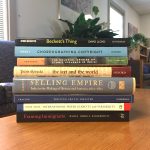 The “Hot off the Presses” series features presentations by CHASS faculty on their recently published books. While their book is still “hot off the press”, the authors give an informal talk about the publication’s themes and expected impact, and/or their experience of writing it. Each talk is followed by a question and answer session with participants. The Center adds these new titles to its growing collection of CHASS publications. Eligible titles may be nominated for the annual Emory Elliott Awards.
The “Hot off the Presses” series features presentations by CHASS faculty on their recently published books. While their book is still “hot off the press”, the authors give an informal talk about the publication’s themes and expected impact, and/or their experience of writing it. Each talk is followed by a question and answer session with participants. The Center adds these new titles to its growing collection of CHASS publications. Eligible titles may be nominated for the annual Emory Elliott Awards.
Book talks in 2022-23 will be hosted online.
2019-20 Events
- Victoria Reyes – Global Borderlands
- Crystal Mun-hye Baik – Reencounters: On the Korean War and Diasporic Memory Critique
- Robb Hernández – Archiving an Epidemic: Art, AIDS, and the Queer Chicanx Avant-Garde
- Deborah Wong – Louder and Faster: Pain, Joy, and the Body Politic in Asian American Taiko
- Randy Head: The Making of Modern Archives
- Michael Alexander: Making Peace with the Universe
- Amanda Lucia: White Utopias
- Ariel Dinar: The Economics of Water Resources: A Comprehensive Approach
- Andy Smith: Otherwise Worlds: Against Settler Colonialism and Anti-Blackness
- Toby Miller: Persistence of Violence and How Green is Your Smartphone?
- David Lloyd: Xicancuicatl: Collected Poems by Alfred Arteaga
- Chris Chase-Dunn: Global Struggles and Social Change: From Prehistory to World Revolution in the Twenty-First Century
- Bella Merlin: Shakespeare & Company: When Action is Eloquence
- Begonia Echeverria: “Witches” and Wily Women: Saving Noka through Basque folklore and song”
- Edward Chang: Pachappa Camp: The First Koreatown in the United States
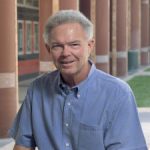 Made possible by gifts from Emory’s family and friends, the Emory Elliott Book Award honors the book published by a CHASS faculty member during the previous academic year that, in the judgment of the selection committee, best exemplifies the values that characterized Professor Elliott and his contributions to life and letters.
Made possible by gifts from Emory’s family and friends, the Emory Elliott Book Award honors the book published by a CHASS faculty member during the previous academic year that, in the judgment of the selection committee, best exemplifies the values that characterized Professor Elliott and his contributions to life and letters.
Among these many contributions are the capacity to recognize complexity together with the passion to clarify, the ability to contribute to a conversation rather than to summarize agreements already established, and the intent to further a tradition of creative and scholarly munificence.
Award Winners
-
2023: Alejandra Dubcovsky (History) – Talking Back: Native Women and the Making of the Early SouthFinalists: Philipp Lehmann (History) – Desert Edens: Colonial Climate Engineering in the Age of Anxiety and Jennifer Syvertsen (Anthropology) – Dangerous Love: Sex Work, Drug Use, and the Pursuit of Intimacy in Tijuana, Mexico
- 2022: Allison Hedge Coke (Creative Writing) – Look at This Blue
Sherryl Vint (English) – Biopolitical Futures in Twenty-First-Century Speculative Fiction
- 2021: Anusha Kedhar (Dance) – Flexible Bodies: British South Asian Dancers in an Age of Neoliberalism
Brandon Robinson (Gender and Sexuality Studies) – Coming Out to the Streets
- 2020: Victoria Reyes (Sociology) – Global Borderlands: Fantasy, Violence and Empire in Subic Bay, Philippines
- 2019: Jade Sasser (Gender & Sexuality Studies) – On Infertile Ground: Population Control and Women’s Rights in the Era of Climate Change
Steven Brint (Sociology) – Two Cheers for Higher Education: Why American Universities Are Stronger Than Ever―and How to Meet the Challenges They Face - 2018: Sang-Hee Lee (Anthropology) – Close Encounters with Humankind: A Paleoanthropologist Investigates Our Evolving Species
- 2017: Charmaine Craig (Creative Writing) – Miss Burma
- 2016: Anthea Kraut (Dance) – Choreographing Copyright: Race Gender, and Intellectual Property Rights in American Dance
- 2015: Conrad Rudolph (Art History) – The Mystic Ark: Hugh of Saint Victor, Art, and Thought in the Twelfth Century
- 2014: Amanda J. Lucia (Religious Studies) – Reflections of Amma: Devotees in a Global Embrace
- 2013: Maudemarie Clark (Philosophy) – The Soul of Nietzsche’s Beyond Good and Evil
Perry Link (Comparative Literature) – An Anatomy of Chinese: Rhythm, Metaphor, Politics - 2012: Priya Srinivasan (Dance) – Sweating Saris: Indian Dance as Transnational Labor
- 2011: Michelle Raheja (English) – Reservation Reelism: Redfacing, Visual Sovereignty, and Representations of Native Americans in Film
Student Research
Graduate student fellows in this program receive support for summer writing projects and the opportunity to connect with other UC graduate fellows in virtual meetings and workshops. The fellowships are funded through a collaborative grant from the UC Humanities Consortium.
2021 Fellows
Stephanie DeMora, Politcal Science, Who Supports Her? The Conditions of Gender Specific Voting
Grecia Perez, Anthropology
Evelyn Pruneda, Sociology, Navigating Multidimensional Borderlands: How Spatial Politics and Inequalities Shape the Working Conditions and Lived Experiences of Women Farmworkers in Rural California
2022 Fellows
Jeff Chu, History, Thracians among Others: Encounters with Greeks, Macedonians, and the Near East
Xiomara Forbez, Dance, Prima, ‘Olapa, Bachatera – Name Me Dancer: Expanding the Category of Dancer through Ballet, Hula, and Bachata
Deborah Nelson, Philosophy, The Reasoning of Economically-Disadvantaged People
Nattapol Wisuttipat, Music, Spicy: The (Un)making of Queer Presence in Thai Classical Music
2023 Fellows
Nicole Furtado, English, Galaxies like Islands, Islands like Galaxies: Envisioning Futurity in Seascape Technologies
Rotem Herrmann, Philosophy, Body and Memory: An Inquiry into Skill
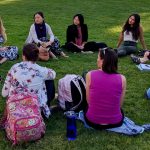 The Humanities Graduate Student Research Grants assist CHASS graduate students involved in original research or creative projects in the humanities. Awarded funds are primarily intended for research proposals related to dissertation or MFA work, though other projects are considered as funds permit.
The Humanities Graduate Student Research Grants assist CHASS graduate students involved in original research or creative projects in the humanities. Awarded funds are primarily intended for research proposals related to dissertation or MFA work, though other projects are considered as funds permit.
The award process is competitive. Applications are collected each fall and announced the following spring. Projects are judged according to intellectual merit, faculty support and justification for the proposal as it relates to completion of the dissertation or MFA project.
The Humanities GSR Awards are sponsored by UCR Graduate Division, the College of Humanities, Arts, and Social Sciences, and the Center for Ideas and Society.
We congratulate the following award winners!
| 2024-25 Winners | 2022-23 Winners |
|---|---|
|
Jose Alvarez (Anthropology)
Sunshine Blanco (Anthropology) Tiffany Bragg (History) Paula Cucurella (Hispanic Studies) Iliana Cuellar (Comp Literature) Mai Do (Political Science) Liseth Espíndola (Hispanic Studies) Rory Fewer (Music) Yun Ge (Anthropology) Nicolas Hennig (Hispanic Studies) Daisy Herrera (History) Kate Huang (Comp Literature) Marissa Hull (History) Negar Kamali (Dance) Ashley McNelis (History of Art) Maria de losAngeles Aldana Mendoza (Hispanic Studies) Ashley Miller (Psychology) Marina Murillo (History) Eun-A Park (Political Science) Mark Reynolds (History) Brenda Rincon (Psychology) Sarah Salisbury (History of Art) Isis Silva (Anthropology) Hannah Snavely (Music) Tara Westmor (Anthropology) |
Lily Allen (History of Art)
Jose Alvarez (Anthropology)
Tiffany Bragg (History)
Kimberly Diaz (Religious Studies)
Fernando David Márquez Duarte (Pol Science)
Nicole Furtado (English)
Chi Yen Ha (Anthropology)
Koby Hansen (Hispanic Studies)
Kate Huang (Comp Literature)
Minhye Joo (Pol Science)
Ashley McNelis (History of Art)
Allison Moon (CWPA) Motherland
Othandwayo Mgqoboka (Anthropology)
Johanna Najera (Anthropology)
Sophia Rodriguez (Anthropology)
Brianna Simmons (Anthropology)
Chandler Spahr (Psychology)
Chun Chia Tia (Music)
Fulya Felicity Turkman (Pol Science)
Miriam Villazón Valbuena (Hispanic Studies)
Zhiyi Wang (Anthropology)
Rachel Wedemeyer (Anthropology)
Laysi Da Silva Zacarias (Anthropology)
|
Made possible by her children, one of whom is the third director of CIS, this fund provides support for graduate students seeking travel and dissertation support from the Center for Ideas and Society within the majors of History, Art History, and Political Science in the hope that it will help them realize their ambitions and make a contribution through their research to the world of ideas.
Jean Rowe Warnke raised five children in Washington, D.C. during the Post-WWII era and instilled in them, by word and steely example, a commitment to truth, progressive values and generosity of spirit, along with an aversion to anything that smacked of self-promotion, resting on one’s laurels or conceit. She pushed them, and herself, to make a difference, and she committed her formidable energies to bettering the lives of those less fortunate.
The 2019-20 award recipient was Camilla Querin (History of Art) for the project: Dialectics of Malandragem, When Arts Transform the Outcast into a Hero.
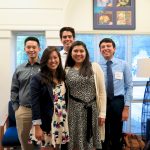 The Mellon Mays Undergraduate Fellowship (MMUF) is a two-year program that provides financial support, research mentorship, and assistance with graduate school applications. The Mellon Mays program at UC Riverside is administered by the Center for Ideas and Society and is funded by an annual grant from The Andrew W. Mellon Foundation. The program is managed by the Center Director (PI) and the CHASS Dean (Co-PI.) Visit UCR’s MMUF website for more information on student eligibility and benefits: mellonmays.ucr.edu
The Mellon Mays Undergraduate Fellowship (MMUF) is a two-year program that provides financial support, research mentorship, and assistance with graduate school applications. The Mellon Mays program at UC Riverside is administered by the Center for Ideas and Society and is funded by an annual grant from The Andrew W. Mellon Foundation. The program is managed by the Center Director (PI) and the CHASS Dean (Co-PI.) Visit UCR’s MMUF website for more information on student eligibility and benefits: mellonmays.ucr.edu
Faculty Program Coordinator: Covadonga Lamar Prieto (Associate Professor, Hispanic Studies)
Administrative Program Coordinator: Katharine Henshaw (Associate Director, Center for Ideas and Society